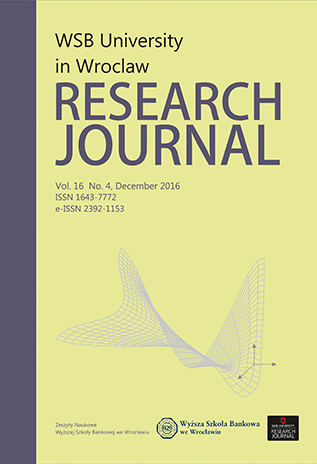Reflection on the Sustainability and Multilevel Antifragility Workshop
DOI:
https://doi.org/10.29015/cerem.308Słowa kluczowe:
Reflection, Sustainability, FragilizationAbstrakt
Aim: The aim of this article is to provide a brief reflection on the campus sustainability workshop that was held on May 13th, 2016 at the WSB University in Wroclaw. The topic of sustainability, and identifying critical threats to sustainability at the institutional level and beyond is of major concern.
Design / Research methods: This reflection relies on a critical review of the discussion and materials presented during the workshop, and the opinion of the author. The observation and participation of the author and fellow participants played a crucial role in shaping the reflection.
Conclusions / findings: Firstly, the conclusion drawn is that the methodology used by the host should be more clearly specified, and the questions should be focused and separated, in order to properly research them. Secondly, given the data that was available, that the study of fragilization in this context should focus on Safe to Fail, instead of Fail Safe approaches, to prevent catastrophic failure events.
Originality / value of the article: The value of this reflection lies in the primary research interest, however, institutions may benefit from the analysis and opinions suggested. Without properly redesigning the study methodology to be more specific, the value of this research in its current form is limited, this author looks forward to the future work on the topic.
Bibliografia
Alvesson, M. and Spicer, A. (2012), A stupidity-based theory of organizations, Journal of Management Studies, vol. 49 no. 7, pp. 1186-1220.
D'Alisa, G., Demaria, F. and Kallis, G., (2014). Degrowth: a vocabulary for a new era. Routledge.
Harford T. (2011), Adapt – why success always starts with failure, Little, Brown, London.
Kahneman D. (2011). Thinking, fast and slow, Penguin Books, London.
Meadows D. (1998), Indicators and information systems for sustainable development, The Sustainability Institute, Hartland.
Perrow, C. (1999). Normal Accidents. Princeton: Princeton University Press.
Platje, J. (2008), ““Institutional Capital” as a Factor of Sustainable development – the importance of an institutional equilibrium”, Baltic Journal on Sustainability, Vol. 14 No. 2, pp. 144-150.
Platje J. (2011), Institutional Capital - creating capacity and capabilities for sustainable development, Wydawnictwo Universytetu Opolskiego, Opole.
Taleb, N.M. (2007). The Black Swan - the impact of the highly improbable. London: Penguin Books.
Taleb, N.M. (2012). Antifragile - things that gain from disorder. London: Penguin Books.
Sterman J.D. (2000), Business dynamics: system thinking and modelling for a complex world, Irwin / McGraw Hill, Boston.
Pobrania
Opublikowane
Numer
Dział
Licencja
Autor przenosi nieodpłatnie na Wyższą Szkołę Bankową we Wrocławiu , bez ograniczeń terytorialnych, majątkowe prawa autorskie do tego utworu w rozumieniu ustawy z dnia 4 lutego 1994 roku o prawie autorskim i prawach pokrewnych ( Dz.U. 1994, Nr 24, poz. 83 ze zm. )na zasadzie wyłączności, tj. prawo do:
a) wyłącznego używania i wykorzystania utworu w dowolnej działalności przez Wyższą Szkołę Bankową we Wrocławiu, w szczególności w działalność Biblioteki Cyfrowej uruchomionej przez Wyższą Szkołę Bankową we Wrocławiu
b) wytwarzania, utrwalania i zwielokrotniania egzemplarzy utworów wszelkimi technikami, w tym techniką drukarską, reprograficzną, zapisu magnetycznego oraz techniką cyfrową, w szczególności ich zwielokrotniania poprzez dokonywanie zapisów na płytach typu CD,
c) zamieszczenia wybranych fragmentów utworu w celach promocyjnych w publikacjach, materiałach promocyjnych, w sieci Internet oraz sieciach wewnętrznych typu Intranet Wyższej Szkoły Bankowej we Wrocławiu,
d) wprowadzania utworu do pamięci komputera Wyższej Szkoły Bankowej we Wrocławiu,
e) kopiowania i powielania utworu w technologiach fotomechanicznych lub innych znanych w dniu zawarcia umowy (fotokopie, kserokopie itp.),
f) przetworzenia dzieła na formę elektroniczną i nieograniczonego rozpowszechniania w sieci Internet.


